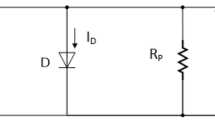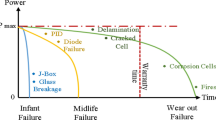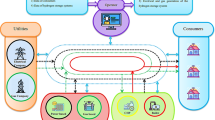Abstract
Rising electricity consumption and environmental pollution have encouraged electrical engineers to use photovoltaic (PV) systems at the power grid level. The use of PVs operating at their maximum power point can provide many benefits to power grids. This study proposes the maximum power point tracking control on the basis of the incremental conductance (INC) using the hybrid crow search and pattern search (HCS-PS) considering adaptive neuro-fuzzy inference system. The HCS-PS is employed to attain optimal voltages in various temperatures and irradiances circumstances. Then, the tracking cycle procedure is started using the INC method. Since the output power of PV systems is associated with uncertainties, the use of a storage system can be a great help in providing stable power in the network. The most benefits of the proposed approach include extraordinary efficiency, fast tracing, and stable performance. The usefulness of the recommended technique is confirmed using simulation results under various weather conditions.




















Similar content being viewed by others
Data availability
Enquiries about data availability should be directed to the authors.
References
Aldair AA, Obed AA, Halihal AF (2018) Design and implementation of ANFIS-reference model controller based MPPT using FPGA for photovoltaic system. Renew Sustain Energy Rev 1(82):2202–2217
Ali MN, Mahmoud K, Lehtonen M, Darwish MM (2021) Promising MPPT methods combining metaheuristic, fuzzy-logic and ANN techniques for grid-connected photovoltaic. Sensors 21(4):1244
Askarzadeh A (2016) A novel metaheuristic method for solving constrained engineering optimization problems: crow search algorithm. Comput Struct 1(169):1–2
Bahrani P, Jain N (2022) Performance analysis of P&O and FLC method of MPPT for PV module based on five-parameter model. In: Proceedings of international conference on computational intelligence and emerging power system (pp. 357–369). Springer, Singapore
Bataineh K (2019) Improved hybrid algorithms-based MPPT algorithm for PV system operating under severe weather conditions. IET Power Electron 12(4):703–711
Beigi AM, Maroosi A (2018) Parameter identification for solar cells and module using a hybrid firefly and pattern search algorithms. Sol Energy 1(171):435–446
da Rocha MV, Sampaio LP, da Silva SA (2020) Comparative analysis of MPPT algorithms based on Bat algorithm for PV systems under partial shading condition. Sustain Energy Technol Assess 40:100761
Dadfar S, Wakil K, Khaksar M, Rezvani A, Miveh MR, Gandomkar M (2019) Enhanced control strategies for a hybrid battery/photovoltaic system using FGS-PID in grid-connected mode. Int J Hydrog Energy 44(29):14642–14660
Dashtdar M, Dashtdar M (2020) Voltage and frequency control of islanded micro-grid based on battery and MPPT coordinated control. Mapta J Electr Comput Eng (MJECE) 2(1):1–9
Dehghani M, Taghipour M, Gharehpetian GB, Abedi M (2020) Optimized fuzzy controller for MPPT of grid-connected PV systems in rapidly changing atmospheric conditions. J Mod Power Syst Clean Energy 9(2):376–383
Delavari H, Zolfi M (2021) Maximum power point tracking in photovoltaic systems using indirect adaptive fuzzy robust controller. Soft Comput 15:1–7
Deniz E (2017) ANN-based MPPT algorithm for solar PMSM drive system fed by direct-connected PV array. Neural Comput Appl 28(10):3061–3072
Emmanuel M, Rayudu R (2017) The impact of single-phase grid-connected distributed photovoltaic systems on the distribution network using PQ and PV models. Int J Electr Power Energy Syst 1(91):20–33
Guo K, Cui L, Mao M, Zhou L, Zhang Q (2020) An improved gray wolf optimizer MPPT algorithm for PV system with BFBIC converter under partial shading. IEEE Access 2(8):103476–103490
Harrag A, Messalti S (2015) Variable step size modified P&O MPPT algorithm using GA-based hybrid offline/online PID controller. Renew Sustain Energy Rev 1(49):1247–1260
Khan MJ, Mathew L (2021) Artificial neural network-based maximum power point tracking controller for real-time hybrid renewable energy system. Soft Comput 25(8):6557–6575
Lasheen M, Abdel-Salam M (2018) Maximum power point tracking using hill climbing and ANFIS techniques for PV applications: a review and a novel hybrid approach. Energy Convers Manag 1(171):1002–1019
Li X, Wen H, Hu Y, Jiang L (2019) A novel beta parameter based fuzzy-logic controller for photovoltaic MPPT application. Renew Energy 1(130):416–427
Li Y, Samad S, Ahmed FW, Abdulkareem SS, Hao S, Rezvani A (2020) Analysis and enhancement of PV efficiency with hybrid MSFLA–FLC MPPT method under different environmental conditions. J Clean Prod 271:122195
Mansoor M, Mirza AF, Ling Q, Javed MY (2020) Novel Grass Hopper optimization based MPPT of PV systems for complex partial shading conditions. Sol Energy 1(198):499–518
Mansoor M, Mirza AF, Ling Q (2020) Harris hawk optimization-based MPPT control for PV systems under partial shading conditions. J Clean Prod 274:122857
Messalti S, Harrag A, Loukriz A (2017) A new variable step size neural networks MPPT controller: review, simulation and hardware implementation. Renew Sustain Energy Rev 1(68):221–233
Mirza AF, Mansoor M, Ling Q, Yin B, Javed MY (2020) A Salp-Swarm Optimization based MPPT technique for harvesting maximum energy from PV systems under partial shading conditions. Energy Convers Manag 209:112625
Mohammadinodoushan M, Abbassi R, Jerbi H, Ahmed FW, Rezvani A (2021) A new MPPT design using variable step size perturb and observe method for PV system under partially shaded conditions by modified shuffled frog leaping algorithm-SMC controller. Sustain Energy Technol Assess 45:101056
Naidu RP, Meikandasivam S (2021) Performance investigation of grid integrated photovoltaic/wind energy systems using ANFIS based hybrid MPPT controller. J Ambient Intell Humaniz Comput 12(5):5147–5159
Padmanaban S, Priyadarshi N, Bhaskar MS, Holm-Nielsen JB, Ramachandaramurthy VK, Hossain E (2019) A hybrid ANFIS-ABC based MPPT controller for PV system with anti-islanding grid protection: experimental realization. IEEE Access 29(7):103377–103389
Radhika A, Soundradevi G, Kumar RM (2020) An effective compensation of power quality issues using MPPT-based cuckoo search optimization approach. Soft Comput 24(22):16719–16725
Roy RB, Rokonuzzaman M, Amin N, Mishu MK, Alahakoon S, Rahman S, Mithulananthan N, Rahman KS, Shakeri M, Pasupuleti J (2021) A comparative performance analysis of ANN algorithms for MPPT energy harvesting in solar PV system. IEEE Access 13(9):102137–102152
Shengqing L, Fujun L, Jian Z, Wen C, Donghui Z (2020) An improved MPPT control strategy based on incremental conductance method. Soft Comput 24(8):6039–6046
Veeramanikandan P, Selvaperumal S (2021) Investigation of different MPPT techniques based on fuzzy logic controller for multilevel DC link inverter to solve the partial shading. Soft Comput 25(4):3143–3154
Wu D, Nariman GS, Mohammed SQ, Shao Z, Rezvani A, Mohajeryami S (2019) Modeling and simulation of novel dynamic control strategy for PV–wind hybrid power system using FGS− PID and RBFNSM methods. Soft Comput 10:1–23
Zafar MH, Al-shahrani T, Khan NM, Feroz Mirza A, Mansoor M, Qadir MU, Khan MI, Naqvi RA (2020) Group teaching optimization algorithm based MPPT control of PV systems under partial shading and complex partial shading. Electronics 9(11):1962
Funding
This study was not funded by any institution or organization.
Author information
Authors and Affiliations
Corresponding author
Ethics declarations
Conflict of interest
Author declares that he has no conflict of interest.
Ethical approval
This article does not contain any studies with animals performed by any of the authors.
Additional information
Publisher's Note
Springer Nature remains neutral with regard to jurisdictional claims in published maps and institutional affiliations.
Rights and permissions
About this article
Cite this article
Wu, X., Furukawa, N., Tao, H. et al. An efficient tracking of MPP in PV systems using hybrid HCS-PS algorithm based ANFIS under partially shaded conditions. Soft Comput 26, 5699–5717 (2022). https://doi.org/10.1007/s00500-022-06952-w
Accepted:
Published:
Issue Date:
DOI: https://doi.org/10.1007/s00500-022-06952-w




